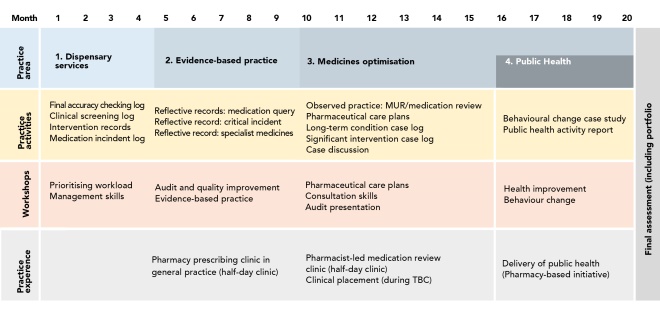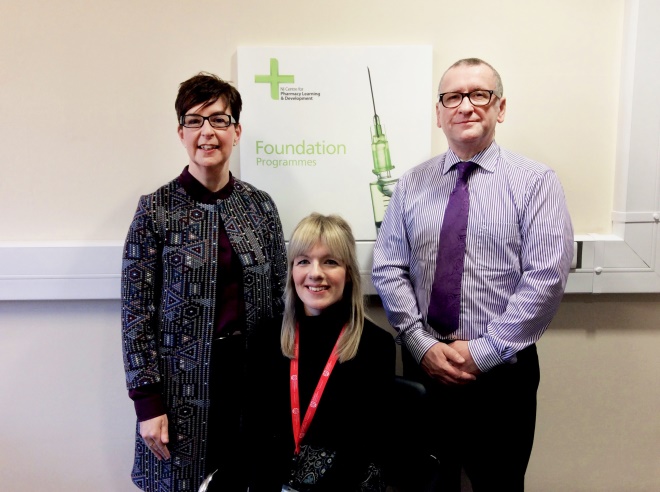
Shutterstock.com
Foundation programmes (FP) are primarily work-based programmes of learning that adopt a structured approach to help practitioners realise competence, demonstrate experience and facilitate advancement.
The Northern Ireland Centre for Pharmacy Learning and Development (NICPLD) foundation programmes are based on the Royal Pharmaceutical Society (RPS) Foundation Pharmacy Framework. The programmes are typically 18-24 months in duration during which time pharmacists build a portfolio of evidence to demonstrate their increasing competence in relation to the framework.
A hospital FP was introduced in Northern Ireland approximately 10 years ago and is now well established as the national training policy for all early-career hospital pharmacists. Increasingly, more complex patients are being managed within the primary-care sector and it is therefore important that community pharmacists have the skills required to contribute to the management of patients with multi-morbidities within their home environment. To support the development of this required competence, an FP for early-career community pharmacists was developed.
We based the new programme on the hospital FP model, taking into consideration the differences between community and hospital pharmacy. Importantly, community pharmacists are typically independent, sole practitioners who have limited support within the workplace in terms of peers or mentors. Foundation training is not a self-development programme, but one in which the FP pharmacist is guided and supported throughout their training. Given that on-going peer support and role modelling is an important aspect of the hospital programme, this issue needed to be addressed. In designing the programme we had to acknowledge that community pharmacists have no protected learning time within the workplace and therefore may have limited opportunity to complete practice activities. Finally, as educational providers, we needed to be mindful that there may be considerable geographical dispersion amongst our learner group and we needed to consider how we could support participants in a similar manner to hospital foundation pharmacists who are supported through their FP journey.
Consideration of these factors did not hinder our ambition, in fact, it only served to highlight further the real need for an FP in this sector. In taking all of these factors into account, we developed a bespoke programme to meet the learning needs of early-career community pharmacists.
This diagram outlines the content of the programme.

Source: Catherine Shaw
NICPLD foundation programme structure
The programme focuses on the development of competence across four practice areas; Dispensary services, Evidence-based practice, Medicines optimisation and Public health. Each practice area has associated practice activities, workshops and practice experiences, including reflective accounts, case-based discussions, pharmaceutical care assessments, consultation skills assessments, direct observation of practical skills and peer assessment. The evidence of developing competence contributes to the individual’s foundation portfolio where it is mapped against the RPS Foundation Pharmacy Framework competences. Workshops to ensure ongoing engagement and to support developing competence are typically held bi-monthly, are led by an experienced practitioner and focus on the application of learning to professional practice. These provide an opportunity for individual and group learning, and the establishment of a peer support network. At the end of the programme the portfolio of evidence relating to each individual is assessed and candidates undertake a final interview (akin to a viva) to demonstrate ownership of their portfolio and their ability to apply the RPS Foundation Pharmacy Framework in daily practice.
A key challenge for community foundation training has been the lack of support and mentoring within the workplace. Accordingly, a peripatetic educational supervisor (ES) was employed to provide workplace support and to act as a role model to the early-career pharmacists using three approaches. Firstly, the ES would arrange to meet each FP pharmacist in their practice for peer assessment activities, including direct observation of practice. Secondly, they would ensure ongoing communicaton and provide timely feedback via the e-portfolio. Thirdly, the ES promotes ongoing interaction between FP pharmacists via social media.
The Community FP typically requires 20-22 months to complete. Participants are expected to commit to attending bimonthly workshops and manage their own time to complete practice activities.
The first cohort of seven pharmacists completed the Community FP in June 2018.
Those pharmacists have reported that the programme has given them confidence, the ability to think more clinically and the ability to be reflective in their practice. One pharmacist said “each practice activity demonstrated and improved my skill set tremendously by the end of each practice area”. This confidence has empowered pharmacists to carry out extended services within their community pharmacy setting with one pharmacist reporting “I can do diabetic MURs as I now have confidence to do them – whereas before [the programme] I hadn’t”. The programme has confirmed the pharmacists’ ability to practice at foundation level and many aspire to the further development of their competence as outlined in the Advanced Pharmacy Framework and the Prescribing Competency Framework.
For more information:
Early-career pharmacists working in the community sector and interested in the FP, should download an application form from the NICPLD website (www.nicpld.org). NICPLD also offers foundation programmes to those practising in both hospital and GP practices.
For more information relating to the Community FP, please contact Catherine Shaw, Lead for Community Foundation (Catherine.Shaw@qub.ac.uk) or visit www.nicpld.org.

About the authors:
Colin Adair (right) is director for Northern Ireland Centre for Pharmacy Learning and Development.
Heather Bell (left) is assistant director (Live Education and Training) for Northern Ireland Centre for Pharmacy Learning and Development.
Catherine Shaw (middle) is lead for Community Foundation Programme for Northern Ireland Centre for Pharmacy Learning and Development.
You may also be interested in
The importance of diverse clinical imagery within health education

Government should consider ways to prevent ‘inappropriate overseas prescribing’ of hormone drugs, review recommends
